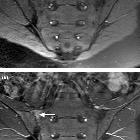SI joints
The sacroiliac joint (SIJ) is a synovial joint between ilium and the sacrum. It has little movement and its main function is to transfer weight between the axial and lower appendicular skeletons. The SI joint is symmetrical joint (i.e. is paired) with an oblique coronal orientation and is located at the S1-3 level .
Summary
- location: the synovial articulation between the sacral and iliac auricular surfaces
- movement: minimal; gliding and rotation
- ligaments and tendons: anterior, posterior and interosseous sacroiliac ligaments; iliolumbar, sacrotuberous and sacrospinous ligaments
- relations: piriformis muscle, lumbosacral trunk; internal, external and common iliac veins
Gross anatomy
Movement
Movement at the sacroiliac joint is minimal and is limited to gliding and rotation. Most movement is experienced during pregnancy due to laxity of ligaments and the joint typically fuses after the age of 50 years .
Articulation
The sacroiliac joint is formed by the irregularly-shaped (jagged) articular surfaces of the sacrum and the ilium, which provide some strength to the joint . The upper one-third is a syndesmosis. The lower two-thirds are lined by articular cartilage, although only the lower third is lined by synovium, while the middle third resembles a symphysis. The iliac auricular surfaces are lined by fibrocartilage, while the sacral auricular surfaces are covered with hyaline cartilage.
Attachments
Musculotendinous
Movement and stability are also conferred by a few muscles :
- latissimus dorsi (via thoracolumbar fascia)
- gluteus maximus
- piriformis
Ligamentous
Being a synovial joint it is surrounded by a capsule. Stability is conferred by the irregular articular surfaces but is actually mainly through extra-capsular ligaments . Ligaments and joints complete the greater and lesser sciatic foramina.
- interosseous sacroiliac ligament: from iliac tuberosity to the sacral tuberosity; located posteriorly; thick and strong; fills the space behind the joint
- anterior sacroiliac ligament
- posterior sacroiliac ligament: located superficial to the interosseous sacroiliac ligament
- iliolumbar ligament
- shaped like a V lying sideways, the apex of the V is attached to the transverse process of the L5 vertebra
- the upper band passes to join the iliac crest and the lower band passes to join the front of the anterior sacroiliac ligament
- sacrospinous ligament
- sacrotuberous ligament
Relations
Primarily anteriorly:
- the internal and external iliac veins join to form the common iliac veins
- lumbosacral trunk and obturator nerve
- piriformis muscle which attaches to the anterior capsule
- ureter
The posterior rami of the spinal nerves and vessels pass between the interosseous and dorsal ligaments.
Arterial supply
Venous drainage
- iliolumbar vein
- superior gluteal vein
- superior lateral sacral veins
Lymphatic drainage
- via iliac and lumbar nodes
Innervation
Via branches from the lumbar and sacral plexuses :
- dorsal rami of S1 and S2
- superior gluteal nerve
- obturator nerve
Variant anatomy
Siehe auch:

 Assoziationen und Differentialdiagnosen zu Iliosakralgelenk:
Assoziationen und Differentialdiagnosen zu Iliosakralgelenk:

